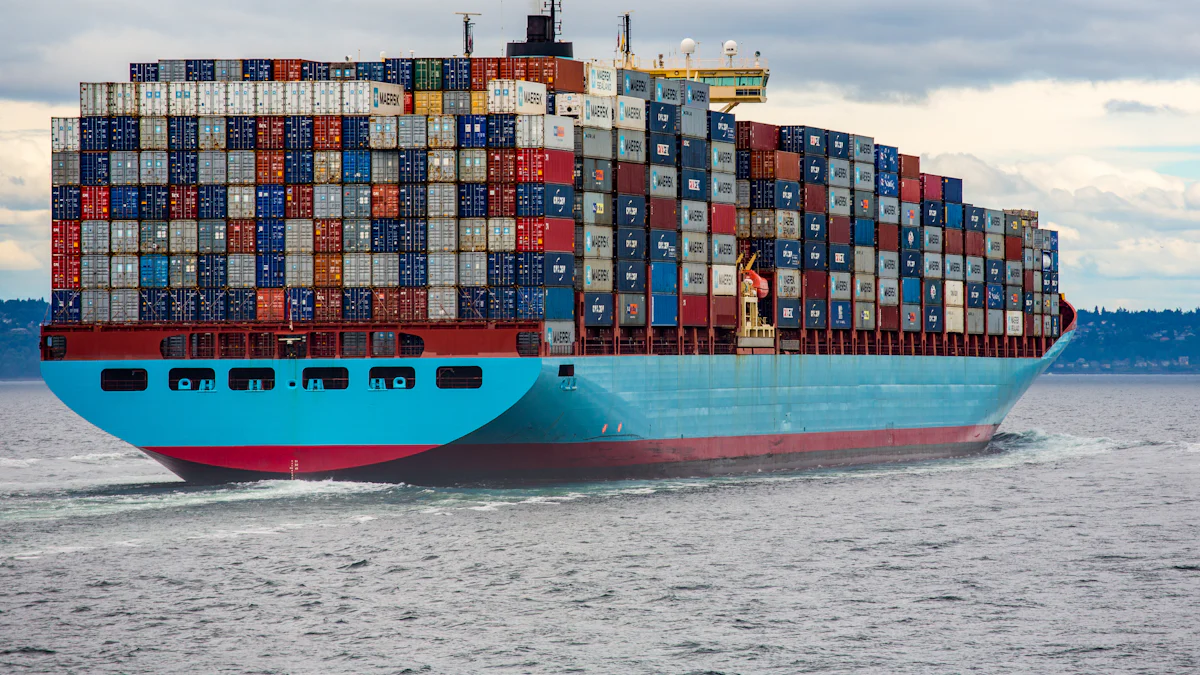Achieving Sustainability in Sea Freight Operations

Sustainability in sea freight plays a crucial role in addressing environmental challenges. Maritime transport contributes approximately 3% to global greenhouse gas emissions, impacting climate change and air quality. Sea freight, however, remains an energy-efficient transportation mode with lower emissions compared to road and air freight. The International Maritime Organization (IMO) has set ambitious targets to reduce these emissions. Sustainable development in ocean freight is essential to minimize ecological footprints and protect marine ecosystems. Prioritizing sustainable practices ensures a healthier planet for future generations.
Environmental Impacts of Sea Freight

Air Pollution
Emissions from Ships
Ships release significant amounts of emissions into the atmosphere. These emissions include carbon dioxide, sulfur oxides, and nitrogen oxides. The shipping industry contributes approximately 3% to global greenhouse gas emissions. This percentage highlights the need for emission reduction strategies. The International Maritime Organization introduced new fuel regulations in 2020. These regulations led to a 25% reduction in ship emissions. Cleaner fuels and improved technologies can further reduce emissions.
Impact on Air Quality
Air quality suffers due to emissions from ships. Sulfur oxides and nitrogen oxides contribute to acid rain formation. Acid rain harms ecosystems and human health. Particulate matter from ships affects air quality in coastal regions. Poor air quality leads to respiratory issues in humans. Reducing ship emissions improves air quality and public health.
Water Pollution
Oil Spills and Chemical Discharges
Oil spills pose a severe threat to marine environments. Spills result from accidents or operational discharges. Chemical cargo residues and cleaning agents also pollute oceans. These pollutants harm marine life and ecosystems. Prevention and response strategies are crucial. Effective measures minimize the impact of oil spills.
Effects on Marine Life
Marine life suffers from water pollution. Oil spills coat marine animals, affecting their ability to move and breathe. Chemical discharges disrupt marine ecosystems. Nonindigenous species from ballast water threaten native species. Protecting marine life requires stringent pollution controls. Sustainable practices help preserve biodiversity in oceans.
Noise Pollution
Sources of Noise in Sea Freight
Sea freight generates noise pollution. Ship engines, propellers, and machinery produce noise. Underwater noise affects marine animals. Noise pollution disrupts communication and navigation in marine species. Reducing noise levels is essential for marine ecosystem health.
Impact on Marine Ecosystems
Noise pollution impacts marine ecosystems significantly. Marine animals rely on sound for survival. Noise interferes with feeding, mating, and migration. Chronic noise exposure causes stress in marine life. Implementing quieter technologies reduces noise pollution. Protecting marine ecosystems requires addressing noise impacts.
Implications of Unsustainable Practices
Economic Consequences
Costs of Environmental Damage
Environmental damage from unsustainable sea freight practices incurs significant costs. Shipping emissions contribute to climate change. Climate change leads to extreme weather events. Extreme weather events damage infrastructure and disrupt trade routes. Repairing infrastructure requires substantial financial resources. The shipping industry faces increased insurance premiums due to environmental risks. Investing in sustainable practices reduces these costs.
Impact on Global Trade
Unsustainable practices affect global trade. Ports and shipping lanes experience congestion due to inefficient operations. Congestion delays the delivery of goods. Delays increase transportation costs and affect supply chain reliability. Customers demand timely deliveries. Unreliable supply chains impact customer satisfaction and business reputation. Sustainable practices improve efficiency and reliability in global trade.
Social Implications
Health Effects on Coastal Communities
Coastal communities face health risks from shipping emissions. Air pollution from ships affects air quality. Poor air quality leads to respiratory diseases in residents. Children and the elderly are particularly vulnerable. Health care costs rise due to increased illness. Implementing cleaner technologies improves air quality. Improved air quality enhances public health in coastal areas.
Loss of Biodiversity
Biodiversity loss results from unsustainable shipping practices. Oil spills and chemical discharges harm marine life. Marine ecosystems suffer from habitat destruction. Nonindigenous species disrupt local ecosystems. Biodiversity loss affects food security and livelihoods. Protecting marine biodiversity requires stringent pollution controls. Sustainable shipping practices preserve marine ecosystems for future generations.
Strategies for Achieving Sustainability

Technological Innovations
Cleaner Fuel Alternatives
Cleaner fuel alternatives play a crucial role in achieving sustainability in sea freight. The maritime industry actively seeks ways to increase sustainability efforts through alternative fuels. Green methanol and other eco-friendly options reduce emissions significantly. These fuels help minimize the environmental impact of shipping operations. Choosing sustainable carriers that prioritize cleaner technologies is essential. This choice reduces the ecological footprint of ocean freight.
Energy-Efficient Ship Designs
Energy-efficient ship designs contribute to sustainability in sea freight. Innovations in hull design enhance propulsion and fuel efficiency. Streamlined shapes and air-lubrication technology reduce emissions by 10-15%. These designs lower greenhouse gas emissions and fuel consumption. Implementing energy-efficient technologies improves environmental performance. The maritime industry recognizes the need for such advancements to protect marine ecosystems.
Regulatory Measures
International Maritime Organization (IMO) Regulations
The International Maritime Organization (IMO) plays a vital role in regulating maritime activities. IMO regulations aim to reduce emissions and improve environmental performance. The organization sets ambitious targets for emission reductions. These regulations encourage shifts to ocean freight to reduce emissions. Compliance with IMO standards ensures sustainable practices in the shipping industry.
National Policies and Incentives
National policies and incentives support sustainability in sea freight. Governments implement measures to promote cleaner technologies. Incentives encourage the adoption of sustainable practices in the maritime sector. These policies align with international efforts to reduce emissions. National initiatives play a significant role in achieving global sustainability goals. Collaboration between governments and industry stakeholders enhances environmental responsibility.
Industry Best Practices
Sustainable Supply Chain Management
Sustainable supply chain management is essential for achieving sustainability in sea freight. Companies focus on minimizing the ecological footprint of shipping operations. Efficient logistics and reduced emissions improve environmental performance. Sustainable practices enhance supply chain reliability and customer satisfaction. Industry leaders prioritize energy efficiency and cleaner technologies. These efforts contribute to a healthier planet for future generations.
Collaboration and Partnerships
Collaboration and partnerships drive sustainability in the maritime industry. Stakeholders work together to develop innovative solutions. Joint efforts lead to the adoption of green fuels and smart technologies. Partnerships foster knowledge sharing and best practices. Collaborative initiatives enhance environmental efficiency in transportation. The maritime industry benefits from collective action towards sustainability goals.
Sustainable Development in Ocean Freight
Integrating Sustainable Development in Ocean Freight
Sustainable development in ocean freight requires innovative approaches. The industry must focus on reducing environmental impacts. Alternative fuels play a crucial role in this transition.
Role of Alternative Fuels
Alternative fuels offer significant benefits over traditional fuels. Traditional fuels emit carbon dioxide and particulate matter. These emissions harm the environment and contribute to climate change. In contrast, alternative fuels like biofuels, hydrogen, and electric power minimize environmental impact. Modern cargo ships use energy-efficient engines with these green fuels. This shift reduces greenhouse gas emissions and enhances sustainability. Evaluating different fuels and technologies remains essential for ongoing sustainability efforts.
Importance of Energy Efficiency
Energy efficiency is vital for sustainable development in ocean freight. Efficient practices lower fuel consumption and emissions. Streamlined ship designs improve propulsion and reduce drag. Air-lubrication technology further enhances fuel efficiency. These advancements decrease emissions by 10-15%. Energy-efficient engines and operations contribute to a low-carbon future. The maritime industry recognizes the need for continuous improvements. Sustainable practices ensure a healthier planet for future generations.
Sustainability in sea freight operations holds immense importance. Sea freight offers an energy-efficient transportation mode with lower emissions compared to road and air freight. Industry stakeholders should adopt sustainable practices and technologies. Cleaner fuels and smart technologies can reduce environmental impacts. The maritime industry plays a crucial role in minimizing ecological footprints. Prioritizing environmental responsibility ensures a healthier planet for future generations. A holistic approach is essential for sustainable shipping. Optimizing supply chains and leveraging multimodal transportation options can lead to meaningful reductions in emissions.
See Also
Sustainable Transport Solutions for Efficient Supply Chain Management
Exploring the Latest Trends in Sea Freight Logistics for 2024
JUSDA's Sustainable Logistics Expansion for Enhanced Efficiency
Innovative Approaches by JUSDA to Enhance Supply Chain Sustainability
The Transformative Power of Supply Chain Innovation in Logistics
